When three little girls were reportedly murdered by a 17-year-old youth from a first-generation migrant family, long-simmering resentments against the perceived “outsiders” led a small minority in the Southport to snap. They were joined by organised agent provocateurs, bussed in from the surrounding areas. Not surprisingly, the Southport residents’ volatile reaction triggered unrest in similar communities across the UK.
There is no excuse for violence. The ethnicity of the suspected murderer or their immigration status did not justify the ensuing disorder. But to claim that this reported tragedy, racism and bigotry were the only “causes” of the UK-wide upheaval, while neglecting the decades of structural economic and political oppression foisted upon the Southport community and on countless others like it, completely ignores the many of antecedents for the unrest.
Speaking on 1st August in a live televised statement to the nation, UK Labour Prime Minister Keir Starmer declared there would be a time for questions and that this future investigation would place the Southport “victims and families” at the heart of any discussions. “Now” was not “the time for answering those questions,” he said. Begging the question: when is the time?
The apparent “far-right violence” broke out in some of the most impoverished and effectively disenfranchised communities in the UK. The deputy director of the Migration Observatory at the University of Oxford, Rob McNeil, observed:
These are often communities that are already socio-economically deprived, and have high unemployment, which can contribute to a sense that there is competition for scant resources.
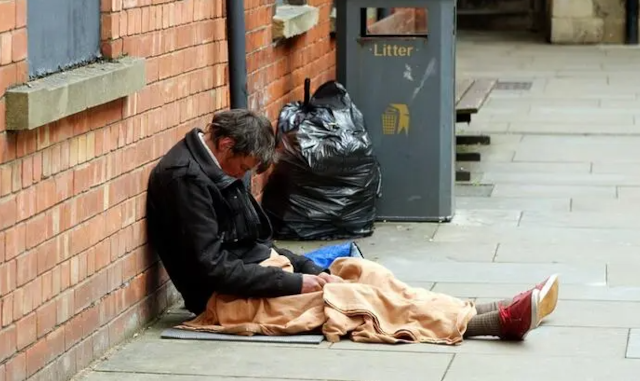
To reiterate, while there is no excuse for violence, nonetheless, if these communities remain unable to address their underlying problems it is likely that unrest will occur again. Certainly, the socio-economic and political environment is fertile ground for those who might want to encourage violence and disorder.
Unfortunately, the Westminster clique holds the working-class families in these regions of the UK in disregard and has done so for generations. It does not treat them fairly and does not afford them equality of opportunity, regardless of which political party rules.
Consider the different approaches Prime Minister Keir Starmer takes to civil unrest. In 2020, when he was leader of the Labour Party in opposition—from 2020 through July 2024—when disorder broke out he did not single anyone out as racists or thugs.
In May 2020, a series of protests—organised by Black Lives Matter (BLM) and Stand Up to Racism (SUTR)—were held across the country after the Minneapolis police in the US killed George Floyd. Some comparatively limited violence and public disorder broke out in a few UK towns and cities. Protesters clashed with police, most notably in London, where 14 police officers were reportedly injured. After the clashes, Starmer was willing to answer the questions of the protesters almost immediately. He very publicly “took the knee” in support of the protesters’ objective
Starmer openly supported BLM- and SUTR-aligned protesters—who were disorderly and fought the police—yet a few years later he responded to unrest in other communities by condemning what he called the “far-right hatred” of “a gang of thugs.” Starmer decried the so-called “far-right” protesters who threw flares “at the statue of Winston Churchill.” Again, let’s contrast this to his response in 2020.
When BLM and SUTR protesters destroyed historical monuments in Bristol and elsewhere in 2020, Starmer genuflected in supplication to the protesters, expressed empathy for their cause, and offered tacit approval for their disorderly conduct. With regard to the civil unrest in Southport, he said it was “not protest” and was “not legitimate” and was nothing but a crime. Quite obviously, the prime minister does not apply the same standards to everyone or to every disorderly protest. Starmer’s response to social disorder is evidently, entirely subjective.
While it is perfectly natural to support the objectives of one protest and oppose the objectives of another, surely violent disorder, vandalism and looting are crimes, no matter who commits them or what justification they pretend to have. Not only was the UK government’s reaction to the recent unrest excessive, but it appears to be biased.
According to the 2021 UK Census—the last to be conducted—approximately 82% of the UK population is “White British.” Around 9% of the population is “Asian,” 4% is “Black” (African or Caribbean), 3% is from “Mixed” or “Other” ethnic groups (including “Other White” ethnic groups), and 2% is classed as “Other.”
There is little doubt that poverty disproportionately impacts ethnic minorities in the UK. A 2024 study by the Joseph Rowntree Foundation (JRF) found that poverty rates among Asian, Black, and Other ethnic minority groups were consistently between 40% and 50%-plus in some communities. Poverty was measured at 53% in the Bangladeshi community, for example. By contrast, it stood at 19% in White-British communities.
But this does not paint the whole picture.
If we consider population size, the number of White-British people in poverty is more than ten times greater than, for example, the number of impoverished Asian people living and working in the UK. What is most striking about the JRF research is the entrenched poverty common to every community, regardless of ethnicity or religion.
Very deep, structural poverty is defined by the JRF as households where the reported income is less than 40% of national median income after housing costs (AHC). According to the JRF:
In 2021/22, 6 million people — or four in ten of those in poverty —were in very deep poverty, with an income far below the standard poverty line. More than twice as many (over 12 million people) had experienced very deep poverty in at least one year between 2017/18 and 2020/21. [. . .] The poorest families — those living in very deep poverty — had an average income that was 59% below the poverty line, with this gap increasing by around two-thirds over the past 25 years. [. . .] Since 1994/95, the percentage of people in poverty who are in very deep poverty has increased, and now makes up the largest group of people in poverty.
No matter what community people live in, irrespective of their ethnicity or religious beliefs, it is the children, the elderly, single parents, and the disabled—the most vulnerable in society—who bear the brunt of this endemic poverty. Successive UK governments, regardless of political party affiliation, have done less than nothing to address these problems. In fact, for three decades, every UK government has presided over a worsening situation.
With regard to poverty distribution, the JRF found clear disparities between the regions of the UK:
West Midlands had the highest rate of poverty at 27%, followed by the North East and London (both 25%), Yorkshire and the Humber, the East Midlands and the North West (all 23%). [. . .] In the West Midlands and the North East, around one in four working-age adults were not in work or studying, compared with fewer than one in five in the regions with the lowest rates of poverty (the South West, South East and East of England).
Reporting on where migrants settle in the UK, the Oxford University’s Migration Observatory, noted in 2022:
London is the most popular destination in the UK, particularly for non-EU migrants. [. . .] Non-EU migrants outnumber EU migrants in most UK nations, regions and local authorities. [. . .] Migrants in London are less likely to have come for family and more likely to have come for work or asylum than migrants in other parts of the UK. Asylum seekers awaiting a decision on their application make up a higher share of the [migrant] population in the north of England, the West Midlands and Wales, and a lower share in the South East, East of England and South West.
In other words, UK inward migration from non-EU migrants is to the most impoverished UK communities. The indigenous White-British communities, already struggling more than others, live in the depressed regions where non-EU migrants are settled. These are also the regions where most asylum seekers are placed by the UK government.
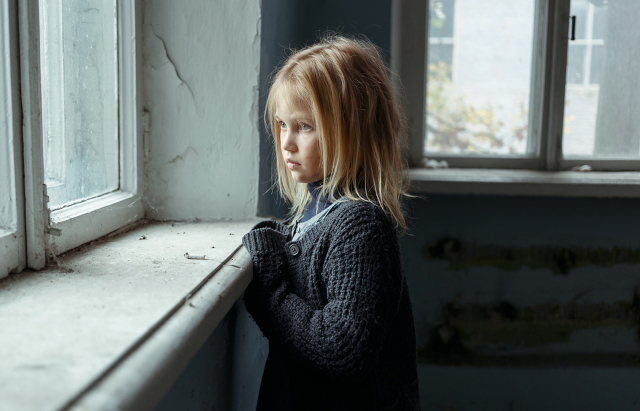
This is not the “fault” of the migrants or the asylum seekers. The vast majority come to the UK seeking a better life for themselves and their families. Often due to being displaced by NATO backed wars or the neo-colonial exploitation of their countries and economies by global corporations.
In the UK, due to a prolonged lack of UK government investment in education and training, it is hard to see how critical services, such as the UK National Health Service (NHS), could function—inasmuch as it does—without migrant workers. A 2023 UK parliamentary research report noted that 27% of NHS nurses and 35% of NHS doctors were migrant workers.
Net migration to the UK is similar to levels of migration to other European countries. Migration, especially of people who take jobs in the health and social care industry sectors, has been actively encouraged by the government. Consequently, net migration to the UK in 2023 was an estimated 685,000, a slight decline from the record high of 720,000 in 2022. In addition, according to official sources, approximately 140,000 illegal migrants arrived the same year. Many subsequently claimed asylum in the UK.
For obvious reasons, lots of migrants settle, or eventually settle (in the case of asylum seekers), within their own communities and perhaps with family already living in the UK. Asylum seekers have little or no choice where they go. They are initially housed by the UK Home Office. As we’ll discuss in a moment, this reportedly has a significant cost impact on UK public finances.
These same, poorer UK communities, experiencing demographic change faster than others, are also living in the regions of the UK that suffer most from a lack of investment. A recent paper from the Productivity Institute at Manchester Business School found:
Low overall levels of both private and public investment appear to be endemic to the UK economy as a whole, and these heavily reflect, and are reflected by, large UK regional disparities. Indeed, the geographical patterns of publicly-funded productivity-enhancing investments across R&D, transport infrastructure, heritage and culture appear, if anything, to exacerbate the UK’s regional inequalities, and nor can these geographically skewed public investment patterns be defended on the basis of value-for-money or cost–benefit calculations. The UK is in many ways therefore a ‘hub no spokes’ economy in which the regional inequalities are central to this problem, and the causes of these regional inequalities are a result of both private sector market failures and also public sector decision-making failures, in both cases due primarily to central government errors.
The poorest communities in the UK, expected to cope with the cultural transformation that accompanies inward migration, are also the least likely to receive either public or private investment. As local populations grow and the demographic mix of their community shifts, there is no corresponding improvement to their essential services or local economies.
Their transport infrastructure is not upgraded, additional housing is not constructed, and new employment opportunities are not created. On the contrary, by every measure, the economic outlook in these regions of the UK is deteriorating and has been deteriorating for decades. This is the result of consistent and seemingly unrelenting government policy. Regardless of who the people vote to represent them, they never gain any sociopolitical or economic benefit.
Social tension is understandably high in these regions. Yet, when the lid eventually blew off this high-pressure environment, the people living in these subjugated communities were verbally attacked by the entire UK legacy media. They were castigated as racists, far-right extremists, even neo-Nazis.
The prime minister characterised them only as thugs and told them that now is not the time to answer their questions or address their concerns. The glitterati and the woke Champaign-socialists who live in the shires and the leafy suburbs also derided the protests as the product of hateful racism.
This is not to say that unwarranted racism and bigotry did not play its part in the protests, but the accusation falls a long way short of accounting for the unrest. The effective disenfranchisement of large sections of the population does, however, go some way to explaining how the UK’s Labour government, led by Starmer, reportedly managed to gain support from just 20% of the electorate yet still secured a massive parliamentary majority.
The legacy media claimed that nearly 80% of the UK electorate did not vote for the current UK government. It also said that national turnout in the 2024 general election was 60%—the lowest since 2001. This figure was actually favourable to the government. Subsequent research by the Institute for Public Policy Research (IPPR) discovered the national turnout was only 52%.
The IPPR analysed the numbers provided by the House of Commons Library, the Office for National Statistics, and the BBC. These numbers included UK adults who are not registered to vote. There are many reasons why people are not registered to vote in the UK. The UK Electoral commission found that “young people, students and those who have recently moved” form the majority of unregistered voters. We might, therefore, consider the IPPR figure more accurate than the research reported by the legacy media. Thus, the 52% turnout figure evealed by the IPPR meant that the 2024 UK general election had the lowest turnout since universal suffrage began in the UK in 1928.
By far the biggest “vote” was from non-voters who, in effect, voted for no government at all. A full 48% of UK citizens couldn’t be bothered to vote for any political “leaders.” This was almost three times the size of the small minority—17.5% of the UK electorate—who imposed the current government on everyone else.
An electoral mandate is defined as “a strong and clear message from the citizenry endorsing the winner’s programme and giving the in-party the policy-making resources to enact it.” When, roughly, only one in every six citizens chooses to elect a government, it is hard to see how that government can claim any kind of legitimate electoral mandate.
Nonetheless, farcical “democratic” systems aside, it should come as no surprise that turnout was the lowest in the effectively disenfranchised regions where the recent unrest broke out. Constituencies in Manchester, Leeds, Hull, and Birmingham saw registered voter turnouts as low as 40%.
Looking at voter patterns across the UK, the IPPR said:
Put simply, the ‘haves’ speak much louder than the ‘have-nots’ in British democracy. Those who stand to benefit most from democratic policymaking are those with the weakest voices in the room. [. . .] Why have we allowed housing to become so unaffordable? Why have we tolerated income and wealth inequality to rise and remain high?
The IPPR observation that people living in these regions, cities, and towns of the UK are those “who stand to benefit most from democratic policymaking” is an assumption not born out by reality. They have not benefited from “democratic policymaking.” Why, then, should the people living in these regions continue to pretend they could?
There is deep resentment and justifiable anger in communities across the UK. Social deprivation on this scale is ripe for extremists and hate mongers to exploit. When scapegoats are offered and other powerless communities are blamed, this inevitably leads to conflict between those communities.
But we should be extremely wary of accepting the claims of the legacy media and the establishment that “racism” or “far right” ideology is dominant in these communities. This too appears to be an unfounded assumption.
During the disorder in the Yorkshire town of Rotherham, a hotel that housed asylum seekers was attacked and attempts were made to burn it down. Reportedly, more than 200 people were “trapped” inside. Thankfully, no one in the hotel was injured. (The police said all the residents had been moved to another location.) Fifty-one officers, present at the Rotherham clashes, were injured, according to South Yorkshire police officials.
The next day volunteers from the Rotherham community assisted with the cleanup of the hotel and the surrounding area. Some spoke to the legacy media and expressed their dismay at the events that unfolded. They said they had no problem with the people housed in the hotel but were angered by the destruction and vandalism committed by outsiders who had come to Rotherham to vandalise property. Of the 20 men subsequently convicted for violent disorder, the majority had arrived from other towns in the region.
Speaking of the housing of asylum seekers in the town, one Rotherham resident said:
This area isn’t suitable for them [the asylum seekers]. There’s nothing for them to do and there’s no public transport for them to go anywhere.
This observation says a lot about the underlying source of tension. It cannot be plausibly construed as a comment from the “far right.” Certainly, economic and social deprivation is no excuse for racism or religious bigotry, but there is no evidence that the majority of people living in the worst-affected regions are either racists or religious bigots. As noted by another Rotherham resident, who was asked about the asylum seekers housed in the hotel:
I can’t believe the lies that the people who don’t even live here were saying. Initially, the hotel was used for Afghan families, and we were totally on board with that. When they said single people were going to be moved in, we were apprehensive, but as the months turned into years, we have had absolutely no bother from these people whatsoever.
Yet such a nuanced view is far from the picture painted by the UK legacy media and UK politicians. That does not mean that there aren’t real tensions between sections of these communities.
When CNN journalists visited the scene at the Rotherham hotel the day after the unrest, they noted that some locals, driving past the hotel, shouted from their vehicles such remarks as “get ’em out.” That plea is indicative of the views of many people in Britain who perceive immigration to be among the causes of their own economic hardship. Another man was reported by CNN as saying that the asylum system in the UK was a problem and that he resented being branded “far right” for expressing his concerns over immigration.
Jordan Parlour (J’P’) was the first person in the UK to be sentenced for making a social media post that reportedly contributed to the the recent disorder. J’P’ pleaded guilty to “publishing written material which is threatening, abusive or insulting, intending thereby to stir up racial hatred”
In his sentencing remarks, Judge Kearl highlighted one of the “hateful” things Jordan Parlour (J’P’) said online—namely, that immigrants “rape our kids and get priority.” Official crime statistics reveal that J’P’s views are broadly unfounded. Prosecution rates for sexual offences are relatively consistent, regardless of ethnicity. The same cannot be said for sentencing. Black UK citizens are notably more likely to serve longer prison terms.
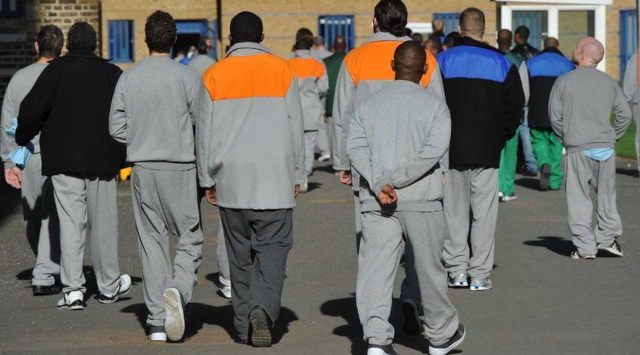
Nevertheless, it is possible to understand why J’P’ held his opinion, be it hopelessly confused. For at least a 16-year period (1997–2013)—though the abuse could be tracked back to the 1980s—organised gangs, overwhelmingly comprised of British-Pakistani men, systematically raped, trafficked, and abused more than 1,400 predominantly White-British children (almost all were girls) in Rotherham and the surrounding areas.
These facts were first clarified by the 2014 Jay Report and later in the 2015 Casey Report. Both inquiries revealed systematic failings on the part of the police and social services to protect the children. The Casey Report highlighted:
The issue of race is contentious, with staff and Members lacking the confidence to tackle difficult issues for fear of being seen as racist or upsetting community cohesion. By failing to take action against the Pakistani heritage male perpetrators of CSE [Child Sexual Exploitation] in the borough, the Council has inadvertently fuelled the far right and allowed racial tensions to grow.
With regard to what J’P’ said about the so-called “grooming gangs,” BBC editor Alison Holt observed:
If this had been dealt with in the right way, then the far right wouldn’t have been able to hijack the argument, because it would have been addressed by the authorities. The right wing just filled a void.
J’P’s notion of immigrants raping children should be understood in the context of the social deprivation and community tensions we have just explored. There is no justification for his racism, but we should also consider the information environment within which it sits—an environment the UN calls the “infosphere.”
The views of J’P’ are not merely the isolated products of mindless racial hatred. To assume as much is to deny how conflicts between communities arise and to ignore how people’s opinions are formed and by whom they are shaped. While it is our individual responsibility to critically evaluate all information, it is also the responsibility of the purveyors not to propagandise information.
To add some clarity to this immensely complex issue, the parliamentary response to the 2011 comments of former Labour cabinet minister and Lord High Chancellor Jack Straw are worth considering. As awareness of the British-Pakistani child rape gangs started to emerge, Straw told parliament that the Pakistani community had a “specific problem” and that some were targeting “vulnerable young white girls” and were treating them like “easy meat.”
This drew an immediate backlash from a few of his own Labour party colleagues. Labour MP Khalid Mahmood, referencing Straw, responded by saying that “to generalise in this stereotypical manner and castigate a whole community is not becoming of him.” Labour MP Keith Vaz—arguably one of the most corrupt politicians ever to sit in parliament—responded, “I don’t think this is a cultural problem. I don’t think you can stereotype an entire community.”
Straw, Mahmood, and Vaz were all correct to a degree. As we have just highlighted, there is no evidence that any single ethnic group in the UK has a greater or lesser propensity to commit sexual offences. Just as it is not legitimate to brand the entire British-Pakistani community as paedophiles, nor is it reasonable to cast entire White-British working class communities as “far-right” simply because they have concerns about immigration. That said, the child rape and trafficking gangs in Rotherham, Rochdale, and elsewhere were overwhelmingly comprised of British-Pakistani men, and, in particular, they targeted White-British children, though they also targeted children of other ethnicities.
This complexity was not reflected by the UK legacy media nor by the political establishment. For example, in 2017 the Sun published an article by then-Rotherham Labour MP Sarah Champion, in which she wrote:
BRITAIN has a problem with British Pakistani men raping and exploiting white girls. There. I said it. Does that make me a racist? Or am I just prepared to call out this horrifying problem for what it is?
In 2023, the Daily Mail published an article about then-UK Conservative Home Secretary Suella Braverman’s promises to “stamp out” what had come to be called the “grooming gangs.” Bravermen said the British-Pakistani men “hold cultural attitudes completely incompatible with British values.” In other words, she singled out the British-Pakistani culture as an alien threat. We should ask why, because raping children and selling them for sexual exploitation is incompatible with everyone’s values.
Throughout the same period, numerous legacy media outlets reported on the allegedly huge problem of illegal immigration. Illegals, they claimed, were “putting the nation’s schools and hospitals under strain and may not be paying taxes.” The UK government subsequently announced a raft of policies aimed at reducing “net migration” and made it a central campaign issue at election time.
In 2017, then-Home Secretary Theresa May gave a speech at the Conservative Party conference in which she compared the immigration system to “a never-ending game of snakes and ladders.” She promised to do “whatever it takes” to kick out illegal immigrants from Britain.
In the lead up to the recent general election, immigration was again made a key issue by the Conservative government. Leading politicians, such as Prime Minister Rishi Sunak and Home Secretary Priti Patel, offered a slew of policy promises aimed at curbing illegal immigration and pledged to “stop the boats.”
The politicians are not above stoking racial, religious, or political tensions. Home Secretary Suella Braverman described the largely peaceful pro-Palestinian marches as “hate marches.” Eschewing the legacy media’s usual label of “far right,” she offered some support for what she called “right-wing” protesters.
This is the “infosphere” that informs the opinions of people like J’P’. It was created by the state and its sidekick legacy media. And now the state is imprisoning people for expressing their opinions online.
It is important to remember that most of those prosecuted for online offences have been found guilty not the crime of incitement, which no longer exists, but of the new, subjective crime of “encouragement.” Specifically, of encouraging racial hatred by “publishing written material which is threatening, abusive or insulting, intending thereby to stir up racial hatred.” It should also be noted that politicians and the legacy media have been doing exactly that—stirring up racial hatred—for years.
Simultaneously, throughout those years, the legacy media and officials of the state have done absolutely nothing to reduce social and cultural tension. On the contrary, they have done quite the reverse. They have frequently stirred up racial hatred and bigotry for a variety of political and propaganda purposes.
When it suits them, they have actively encouraged community division and have incessantly exploited public disquiet. Not only that, but for decades the policies of the political establishment have increased the pressure on the communities whose citizens they evidently only care about when elections loom and whom they forget soon thereafter.
Racism and religious bigotry are unacceptable no matter who the racists and the bigots are. But the real reasons for the unrest are not simply racism and religious bigotry. Moreover, the legacy media’s and the politician’s characterisation of the unrest, as the product of racist bigotry, is rank hypocrisy.
If the state is serious about tackling the underlying causes of social disorder then suffering communities need inward investment. The state could also stop fuelling the wars and economic exploitation that drives migration. There is no sign of this on the horizon from the new Labour government. If whole regions of the UK remain effectively abandoned then, while government controls people’s lives, civil disorder will be the inevitable response.
Despite all the rhetoric from the previous UK Conservative government about “levelling up,” as we have already discussed, rampant deprivation and regional inequality persists. No meaningful investment from central government aimed at addressing the problems is forthcoming. Instead, when Starmer’s Labour government came to power—after it was resoundingly rejected by the people—one of its first acts was to remove the phrase “levelling up” from government department titles.
The new Labour chancellor of the exchequer, Rachel Reeves, then announced there was an alleged £22bn funding “black hole” in UK public finances and told the UK to expect a series of further public spending cuts and tax increases. This announcement was made to parliament on the 29th July. The murders in Southport dominated the legacy media news that day, effectively burying the government’s own “bad news.”
The next day, the 30th July 2024, the day of the Southport unrest, the new Labour government offered its fiscal plan for “fixing the foundations” of the UK’s beleaguered public finances. The biggest projected overspend problem was identified as public sector pay of £9.4bn. The second was the cost of “Asylum and illegal immigration,” which stands at £6.4bn. Transport infrastructure was also considered too expensive.
The people in the most impoverished towns and cities of the UK have no reason to expect any substantial public or private investment. Instead, they have been offered a semantic change to the naming of Whitehall departments they don’t care about. As their communities starve for a lack of investment, as part of “fixing the foundations,” the Labour Party committed to £3 billion in annual “military assistance to Ukraine” in order to continue a foreign war in Europe.
The government’s alleged funding “black hole” is based upon projected expenditure. This government is using its modelled projections to deny services and economic relief to the British people. The near £13 billion spending commitment for Ukraine, almost £8 billion of which is earmarked for military assistance, is not a “projection.” It is a guaranteed investment that will benefit the shareholders of western arms manufacturers.
Some of the recipients of that military aid to Ukraine will undoubtedly include real neo-Nazis. Yet, following the outpouring of desperate anger in the most hard pressed communities in Britain, rather than offer solutions, Labour Home Secretary Yvette Cooper said the unrest was “fuelled by far right extremists.” Evidently the UK government supports some “far right extremists” while simultaneously claiming to oppose those they blame for civil unrest. Disorder which is actually caused by decades of government neglect and stoked by legacy media propaganda.
The hypocrisy is unbelievable.

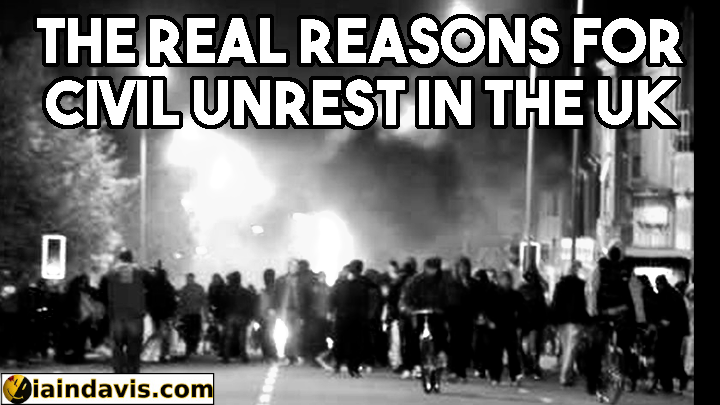




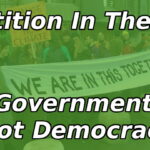
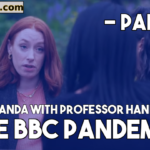
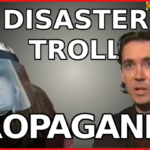
It is true that regardless of which party gets into power social conditions for people in the most deprived areas never improves. It is clear that successive governments hold people in those areas in total contempt and is aided by the legacy media. Choosing to release statements such as the “black hole” in funding and the government’s remedy for this on days when it knows the statements will be overshadowed by other events such as the Southport incident and unrest the following day is a cynical and dishonest tactic used by government’s of all parties to further an unstated agenda.
Thank you for an incisive and well articulated essay, most of which I agree. But I would like to challenge you on a particular aspect. You specifically state that “There is no excuse for violence” and your general tone is that of condemnation of people who exhibit such traits as a result of a prevailing situation. I would suggest however, that there are many historical examples where it was in fact, violence that brought about political and economic change.
The Magna Carta riots and the Peasants’ Revolt of 1381 illustrate how violence can be a potent catalyst for promoting political change. By employing violence as a strategic tool, the (then) rebels were able to draw attention to their grievances, challenge the feudal system, and pave the way for future reforms. While the immediate outcomes were not successful, the long-term consequences of these revolts continue to shape English society and politics to this very day.
More recent examples are The Irish Republican Army (IRA) and the African National Congress (ANC).These are two notable examples of organisations that employed violence as a means to achieve political change. While the effectiveness of violence in promoting political change is debatable, these more recent cases illustrate how violent struggle can be a catalyst for significant political transformations.
Gerry Adams and Martin McGuinness, once associated with the IRA and its militant activities, underwent a remarkable transformation from being labeled as terrorists to being recognised as respected public figures and fully embraced into society.
And there is of course, the remarkable transformation of Nelson Mandela from a branded terrorist to sainthood who is now revered throughout the world.
So whilst I fully respect your condemnation of violence, you can see see that history is replete with examples that illustrate my point and maybe contradict yours.
Yep, I can see there are examples of violence contributing to political change, although the degree to which violence led to change I think is debatable. I hope you can understand that I am morally opposed to violence. I would also suggest to you that there are many more examples of population violence suiting the objectives of the state. To the point that when we look at groups like the IRA and the ANC we see the state deeply embedded within them.
Not in this case Ken.
I firmly believe that the State rubbed its hands in glee when it all kicked off – witness how quickly they cleared out the Prisons to make room for the new inmates, & don’t be surprised if the new online safety Bill is strengthened further to kill off debates, & ensure the only narrative is in line with the Agenda.
It’s almost as if it was all planned?
Note that your examples mention organisations that took many years to form, where as the recent actions came from a disorganised, flash in the pan, rabble…or so it would seem.
What do UK riots, Covid-19, 9/11, transgender, digital currency, and deep sea oil rigs have in common? Absolutely nothing, you’d probably think, but these seemingly unrelated things fit into a larger picture of what is shaping up to be the greatest depopulation in human history.